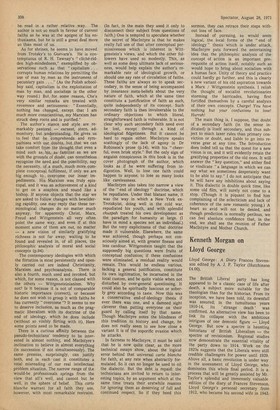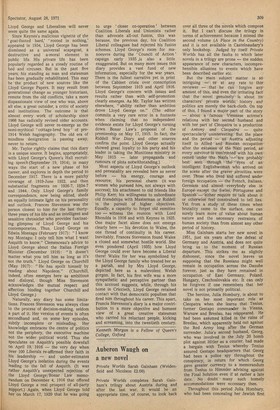Kenneth Morgan on Lloyd George
Lloyd George: A Diary Frances Stevenson edited by A. J. P. Taylor (Hutchinson £4.00).
The British Liberal party has long appeared to be a classic case of life after death, a subject more suitable for the theologian than for the historian. From its inception, we have been told, its downfall was assured; in the tumultuous years 1910-14, its 'strange death' was confirmed. An alternative view has been to link its collapse with the ambitious intrigues of one demonic figure — Lloyd George. But now a spectre is haunting historians of British Liberalism — the spectre of revisionism. Regional studies now demonstrate the essential vitality of the party down to 1914. Work on the 1929s suggests that the Liberals were still credible challengers for power until 1929, Above all, a basic revolution is under way in the assessment of Lloyd George, who dominates this whole final period. It is a process that will be greatly assisted by Mr. Taylor's splendid and immensely valuable edition of the diary of Frances Stevenson, Lloyd George's personal secretary from 1912, who became his second wife in 1943. Lloyd George and Liberalism will never seem quite the same again.
Since Keynes's malicious vignette of the goat-footed bard,' 'rooted in nothing,' appeared in 1934, Lloyd George has been dismissed as a universal scapegoat, a destructive and a-moral element in public life. His private life has been popularly regarded as a steady routine of bed and circuses. But in the past five years, his standing as man and statesman has been gradually rehabilitated. This may be the product of new sources like the Lloyd George Papers. It may result from generational change as younger historians, remote from the old conflicts, take a more dispassionate view of one who was, above all else, a great outsider, a critic of society and institutions. The outcome is that almost every work of scholarship since 1966 has radically revised older accounts. Lloyd George will never re-emerge as the semi-mythical ' cottage-bred boy' of pre1914 Welsh hagiography. The old era of mindless denigration is passing away, never to return.
Mr. Taylor rightly claims that this diary is a unique source. It begins, appropriately, with Lloyd George's Queen's Hall recruiting speech (September 19, 1914), in many ways the start of a new phase of his career, and explores in depth the period to December 1917. There is a more patchy coverage of 1919-June 1922, and then substantial fragments on 1926-7, 1Q34-7 and 1944. Only Lloyd George's family correspondence, now being edited, sheds an equally intimate light on his personality and outlook. Frances Stevenson was the person closest to him for the last thirtythree years of his life and an intelligent and sensitive chronicler who provides fascinating glimpses of Lloyd George and his contemporaries. Thus, Lloyd George on Edwin Montagu (February 1917): "I know my Montagu: I only tell him what I want Asquith to know." Clemenceau's advice to Lloyd George about the Italian Foreign Minister (December 1919): "It doesn't matter what you tell him as long as it's not the truth." Lloyd George on Churchill (May 1917) : "He has spoilt himself by reading about Napoleon." (Churchill, indeed, often emerges here as ambitious and disloyal, though Miss Stevenson acknowledges the mutual respect and affection binding together Churchill and Lloyd George.)
Naturally, any diary has some limitations. Frances Stevenson was always close to the process of decision-making, seldom a part of it. Her version of events is often secondhand and, on some key episodes, subtly incomplete or misleading. Her knowledge embraces the centre of politics not the periphery, the executive machine not the wider political world. Thus she speculates on Asquith's possible downfall on April 19, 1916 — the very day when over 100 Liberals re-affirmed their faith in his leadership — and under-estimates Lloyd George's isolation during the events leading to the fall of Asquith. (It was rather Asquith's unexpected rejection of the Lloyd George/Bonar Law memorandum on December 4, 1916 that offered Lloyd George a real prospect of all-party support.) Again, when Lloyd George told her on March 17, 1920 that he was going
to urge ' closer co-operation' between Coalition Liberals and Unionists rather than advocate all-out fusion, this was because, the previous day, his Coalition Liberal colleagues had rejected his fusion schemes. Lloyd George's room for manoeuvre during the 'Council of Action ' capaign early 1935 „is also a little exaggerated. But on many more issues this diary provides a vast fund of new information, especially for the war years. There is the fullest narrative yet in print of the Cabinet crisis over conscription between September 1915 and April 1916. Lloyd George's concern with issues and results rather than with self-promotion clearly emerges. As Mr. Taylor has written elsewhere, "ability rather than ambition drove Lloyd George on." (The editor commits a very rare error in a footnote when claiming that no independent evidence exists for Lloyd George's turning down Bonar Law's proposal of the premiership on May 17, 1915. In fact, the Riddell War Diary and other sources confirm the point. Lloyd George actually showed great loyalty to his party and his leader in taking the Munitions ministry in May 1915 — later propaganda and rumours of plots notwithstanding.)
Most aspects of Lloyd George's outlook and personality are revealed here as never before — his energy, courage and resource; his personal charm (it was women who pursued him, not always with success); his attachment to old friends like Philip Kerr; his willingness to subordinate old friendships with Masterman or Riddell in the pursuit of higher objectives. Equally, a capacity to forget old enmities too — witness the reunion with Lord Rhondda in 1916 and with Keynes in 1925. One major facet alone does not emerge clearly here — his devotion to Wales, the one thread of continuity in his career. Inevitably, Frances Stevenson found Wales a closed and somewhat hostile world. She even pondered (April 1935) how Lloyd George could ever have become a Liberal there! Wales for her was symbolized by the Lloyd George family who treated her as a pariah, and by Mrs Lloyd George, depicted here as a malevolent Welsh gorgon. In fact, his first wife was a more sympathetic and perceptive partner than this account suggests, while, through his home in Criccieth, Lloyd George retained contact with that democratic populism that fired him throughout his career. This apart, Francis Stevenson's diary is a major contribution to a more objective and humane view of a great creative statesman who carried his reluctant people, kicking and screaming, into the twentieth century.
Kenneth Morgan is a Fellow of Queen's College, Oxford



































 Previous page
Previous page